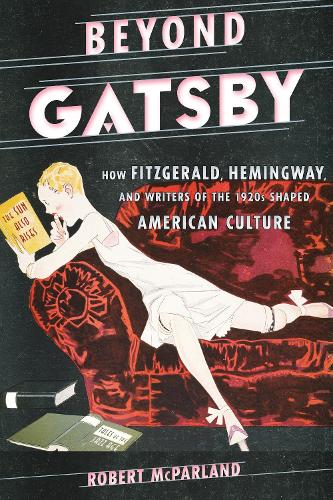
Beyond Gatsby: How Fitzgerald, Hemingway, and Writers of the 1920s Shaped American Culture
(Paperback)
Available Formats
Publishing Details
Beyond Gatsby: How Fitzgerald, Hemingway, and Writers of the 1920s Shaped American Culture
By (Author) Robert McParland
Bloomsbury Publishing PLC
Rowman & Littlefield Publishers
1st November 2017
United States
Classifications
General
Non Fiction
Literary studies: c 1900 to c 2000
813.5209
Physical Properties
Paperback
274
Width 150mm, Height 230mm, Spine 21mm
408g
Description
Many of the heralded writers of the 20th centuryincluding Ernest Hemingway, John Dos Passos, F. Scott Fitzgerald, and William Faulknerfirst made their mark in the 1920s, while established authors like Willa Cather and Sinclair Lewis produced some of their most important works during this period. Classic novels such as The Sun Also Rises, The Great Gatsby, Elmer Gantry, and The Sound and the Fury not only mark prodigious advances in American fiction, they show us the wonder, the struggle, and the promise of the American dream. In Beyond Gatsby: How Fitzgerald, Hemingway, and Writers of the 1920s Shaped American Culture, Robert McParland looks at the key contributions of this fertile period in literature. Rather than provide a compendium of details about major American writers, this book explores the culture that created F. Scott Fitzgerald and his literary contemporaries. The source material ranges from the minutes of reading circles and critical commentary in periodicals to the archives of writers worksas well as the diaries, journals, and letters of common readers. This work reveals how the nations fiction stimulated conversations of shared images and stories among a growing reading public. Signifying a cultural shift in the aftermath of World War I, the collective works by these authors represent what many consider to be a golden age of American literature. By examining how these authors influenced the reading habits of a generation, Beyond Gatsby enables readers to gain a deeper comprehension of how literature shapes culture.
Reviews
The 1920s, one of the more colorful decades of the 20th century, inspired a generation of writers who captured the changes in America following World War I. First called the Jazz Age by F. Scott Fitzgerald, it was a time of new optimism and breaking the old Victorian taboos. In this carefully researched cultural history, McParland takes a new look at classics such as Fitzgeralds The Great Gatsby, William Faulkners The Sound and the Fury, and Willa Cathers O Pioneers!, showing how the works represented the era and reflected universal human concerns. He points out how Ernest Hemingway and others helped forge an American literature independent from older English writing. The impressive, unusual list of sources includes critical commentaries of the time and articles by readers, revealing how they reacted to the narratives and characters. VERDICT This thorough and penetrating analysis succeeds in showing the 1920s to be a golden age of American literature that still influences readers and scholars. The unusual blend of criticism and social history will appeal primarily to literature students and specialists in the field of cultural studies. * Library Journal *
MacParland has done an impressive amount of research[.] * Publishers Weekly *
This reviewer would argue that the most formative period in American literature and culture was that of Poe, Whitman, Twain, and Emersonand, given a predilection for naturalism, London, Crane, and Norris. This impossible list covers an unwieldy collection of decades. In choosing the 1920s, McParland captures in one decadethe qualities of the unworkable inventory just mentioned. He providesan originalstudy of the writing of the 1920s, a veritable revelationto which readers respond Of course! Of course, Fitzgerald and Hemingway excoriate and interrogate materialism withits attractions and its discontents. Of course, Dreiser's naturalism and Faulkner's hypnotic experimentalism form a critique of American society both congruent with and divergent from those found in Gatsby and A Farewell to Arms. In sum, McParland considers,intelligently and profitably, in one volumetheinfluence of writers such as John Dos Passos, Sinclair Lewis, Langston Hughes, and Carl Van Vechten, among many others. Summing Up: Highly recommended. Lower-division undergraduates through faculty; general readers. * CHOICE *
McParland's Beyond Gatsby [is] impressively researched and smartly organized. * The F. Scott Fitzgerald Review *
Author Bio
Robert McParland is associate professor of English and chair of the Department of English at Felician College. He is the editor of Music and Literary Modernism (2009) and Film and Literary Modernism (2013) and the author of Charles Dickenss American Audience (2010), How to Write about Joseph Conrad (2011), and Mark Twains Audience (2014).
